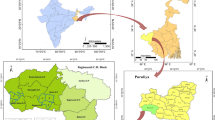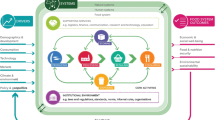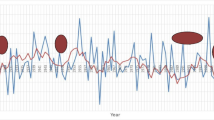Abstract
In 1995, the government of the Republic of South Africa launched the Working for Water (WfW) programme that links environmental and developmental goals through the removal of high water-consuming alien plants with pro-poor rural employment opportunities. Whilst bio-physical evaluations have widely reported on the hydrological, ecological and conservation components of the programme, there exists growing uncertainty over the programme’s role as a poverty reduction mechanism. This paper evaluates three projects in the Luvuvhu catchment, Limpopo Province, against five socio-economic workfare criteria and the underlying biophysical rationale. Results show that asset creation from incremental streamflow is economically efficient and is likely to improve significantly if biodiversity benefits, community harvesting of riparian goods and services, ecological non-use values and seasonal water demand values are incorporated into the analysis. However, socio-economic benefits are more questionable: poverty targeting is weak with wage rates failing to self-select the poor; a minor proportion (0.5%) of catchment households benefit from the highly-valued employment opportunities; high variability in monthly employment causes financial difficulties for labourers; labourers are not ‘empowered’ as is evidenced by the failure of the 2-year exit strategy; and programme efficiency is high in proportional allocation of cash-flow to non-management wage labour. It is concluded that the Working for Programme is a potentially replicable model in other semi-arid contexts in developing countries if based on its core biophysical remit but is a transitory and limited poverty reduction mechanism for improving rural livelihoods.
Similar content being viewed by others
References
Adato, M. and Haddad, L.: 2001, Targeting Poverty Through Community-Based Public Works Programmes: A Cross-Disciplinary Assessment of Recent Experience in South Africa, Food Consumption and Nutrition Division, Discussion Paper No. 121, IFPRI: Washington, DC
W.J.R. Alexander (1985) ArticleTitle‘Hydrology of low latitude southern hemisphere land masses’ Hydrobiologia 125 75–83 Occurrence Handle10.1007/BF00045927
J.M. Bosch J.D. Hewlett (1982) ArticleTitle‘A review of catchment experiments to determine the effect of vegetation changes on water yield and evaporations’ Journal of Hydrology 55 3–23 Occurrence Handle10.1016/0022-1694(82)90117-2
I.R. Calder (1999) The Blue Revolution Earthscan London
I.R. Calder P. Dye (2001) ArticleTitle‘Hydrological impact of invasive alien plants’ Land Uses and Water Resources Research 1 IssueID7 1–12
DWAF: 1997, The Working for Water Programme: Annual Report 1996/9, Department of Water Affairs and Forestry, Pretoria
InstitutionalAuthorNameDWAF (2000) National Water Conservation and Demand Management Strategy for the Forest Sector in South Africa Department of Water Affairs and Forestry Pretoria
DWAF: 2001, The Working for Water Programme: Annual Report 2000/1, Department of Water Affairs and Forestry, Pretoria
InstitutionalAuthorNameDWAF (2003) Water Use Charges for Government Water Schemes and Water Resource Management Charges Department of Water Affairs and Forestry Pretoria
Goldin, J. and Esau, F.: 2003, The Efficacy of the Working for Water Programme’s Exit Strategy, paper presented at the Working for Water Inaugural Research Symposium, 19–21 August 2003, Kirstenbosch, Cape Town, South Africa
Gush, M.B., Scott, D.F., Jewitt, G.P.W., Schulze, R.E., Lumsden, T.G., Hallowes, L.A. and Gorgens, A.H.M.: 2002, Estimation of Streamflow Reductions Resulting from Commercial Afforestation in South Africa, WRC Report No TT 173/02, April 2002. Water Research Commission, Pretoria
Haddad, L. and Zeller, M.: 1996, How can Safety Nets Do more with Less? General Issues with Some Evidence from Southern Africa, Food Consumption and Nutrition Division, Discussion Paper No. 16, IFPRI, Washington, DC
Haddad, L. and Adato, M.: 2001, How Efficiently do Public Works Programs Transfer Benefits to the Poor? Evidence from South Africa, Food Consumption and Nutrition Division, Discussion Paper No. 108, April 2001, IFPRI, Washington, DC
R.A. Hope (2004) Water policy and poverty reduction in a semi-arid catchment University of Newcastle-upon-Tyne UK
R.A. Hope G.P. Jewitt J.W. Gowing (2004) ArticleTitle‘Linking the hydrological cycle and rural livelihoods: a case study in the Luvuvhu catchment, South Africa’ Journal of Physics and Chemistry of the Earth 29 1209–1217
Laros, M., Leslie, K. and Manaka, B.: 2003, External Evaluation of the Working for Water Programme: Summary of Findings and Recommendations, paper presented at the Working for Water Inaugural Research Symposium, 19–21 August 2003, Kirstenbosch, Cape Town, South Africa
LeMaitre, D.C., Van Wilgen, B.W. and Fairbanks, D.H.K.: 1997, Impacts of Timber Plantations on Runoff in South Africa: A Handy Reference Manual, Report ENV/S-C96068, Department of Water Affairs and Forestry, Pretoria
D.C. LeMaitre B.W. Wilgen Particlevan C.M. Gelderblom C. Bailey R.A. Chapman J.A. Nel (2002) ArticleTitle‘Invasive alien trees and water resources in South Africa: case studies of the costs and benefits of management’ Forest Ecology and Management 160 143–159
D. Magdlela (2001) ArticleTitle‘Social challenges in the Working for Water programme: findings from a study of selected projects’ Land Uses and Water Resources Research 1 IssueID8 1–5.
Marais, C., Turpie, J., Mullins, D., Conradie, B., Khan, A., Goldin, J., van Zyl, H., Grobbelaar, E., Vink, N. and Ndxinge, V.: 2001, A Cost Benefit Analysis Framework for the National Working for Water Programme, Nathan Associates Inc., December 2001
J. May (1999) Poverty and Inequality in South Africa: Meeting the Challenges Zed Books London
Mayers, J., Evans, J. and Foy, T.: 2001, Raising the Stakes: Impacts of Privatisation, Certification and Partnership in South African forestry, Instruments for sustainable private sector, forestry series. International Institute for Environment and Development, IIED, London
Olbrich, B.W. and Hassan, R.: 1999, A comparison of the Economic Efficiency of Water use of Plantations, Irrigated Sugarcane and Sub-tropical Fruits. A Case Study of the Crocodile River Catchment, Mpumalanga Province, report No. 666/1/99, Water Research Commission, Pretoria
M. Ravallion (1999) ArticleTitle‘Appraising Workfare’ World Bank Research Observer 14 IssueID1 31–48
RSA: 1998, National Water Act, Government of Republic of South Africa. Act No. 36 of 1998. Government Printer, Cape Town.
D.F. Scott D.C. LeMaitre D.H.K. Fairbanks (1998) ArticleTitle‘Forestry and streamflow reductions in South Africa: a reference system for assessing extent and distribution’ Water SA 24 187–199
Scott, D.F., Le Maitre, D.C. and van Wyk, E.: 1999, The Effects of Forestry on Low Flows: Further Studies on Low Flow in Wet and Dry Cycles and in Relation to Catchments of Increasing size, contract report No. ENV/S-C 99059, Council for Scientific and Industrial Research. CSIR Pretoria
C.M. Shackleton S.E. Shackleton B. Cousins (2001) ArticleTitle‘The role of land-based strategies in rural livelihoods: the contribution of arable production, animal husbandry and natural resource harvesting in communal areas of South Africa’ Development Southern Africa 18 581–604
InstitutionalAuthorNameStats SA (1999) Rural survey, 1997, statistical release: P0360 StatsSA Pretoria
Subbarao, K.: 1997, Public Works as an Anti-Poverty Program: An overview of Cross-Country Experience, paper submitted for the invited session of ASSA Annual Meetings, January 3–5, 1997, World Bank: Washington, DC
Teklu, T.: 1995, Employment Programs for Food Security in Sub-Saharan Africa, 2020 Vision Brief 28, August 1995, IFPRI: Washington, DC
J. Turpie A. Joubert (2001) ArticleTitle‘Estimating potential impacts of a change in river quality on the tourism value of Kruger National Park: an application of travel cost, contingent and conjoint valuation methods’ Water SA 27 3
Turpie, J.: 2003, The Role of Resource Economics in the Control of Invasive Alien Plants in South Africa, paper presented at the Working for Water Inaugural Research Symposium, 19–21 August 2003, Kirstenbosch, Cape Town, South Africa
Turton, A., Nicol, A., Allen, T., Earle, A., Meissner, R., Mendelson, S. and Quaison, E.: 2003, Policy Options in Water-stressed States: Emerging Lessons From the Middle-East and Southern Africa, African Water Issues Research Institute, Pretoria and the Overseas Development Institute, ODI, London
B.W. Wilgen ParticleVan D.M. Richardson D.C. LeMaitre C. Marais D. Magadlela (2001) ArticleTitle‘The economic consequences of alien plant invasions: examples of impacts and approaches to sustainable management in South Africa’ Environment, Development and Sustainability 3 145–168
Versfeld, D.B., Le Maitre, D.C. and Chapman, R.A.: 1998, Alien Invading Plants and Water Resources in South Africa: A Preliminary Assessment, WRC Report No. TT 99/98, Water Research Commission. WRC, Pretoria
Author information
Authors and Affiliations
Corresponding author
Rights and permissions
About this article
Cite this article
Hope, R.A. Water, Workfare and Poverty: The Impact of the Working for Water Programme on Rural Poverty Reduction. Environ Dev Sustain 8, 139–156 (2006). https://doi.org/10.1007/s10668-005-1780-4
Received:
Accepted:
Issue Date:
DOI: https://doi.org/10.1007/s10668-005-1780-4




